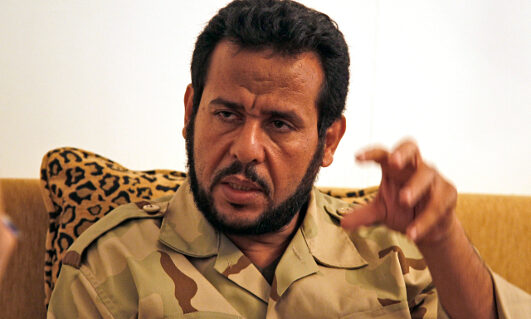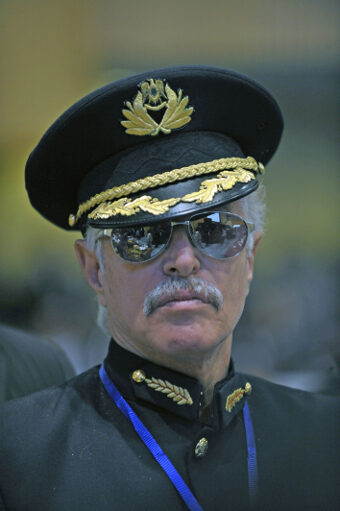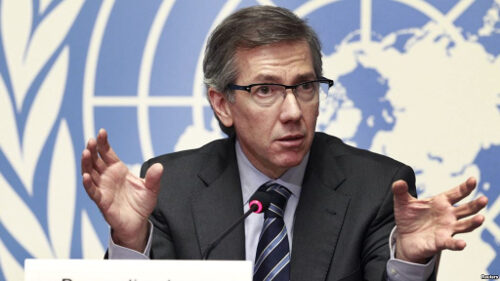LIBYA, SOCIAL REBRANDING AND A NEARLY IMPOSSIBLE PEACE DEAL

Abdel Hakim Belhaj
If you were to find a meaning to what is currently happening in Libya, the news that Abdel Hakim Belhaj is sitting at the negotiating table to decide on his country’s future would probably suffice. Belhaj, also known with the nom de guerre of Abu Abdallah Assadaq, is a former Emir of the Libyan Islamic Fighting Group that opposed Muammar Gaddafi. He fought in Afghanistan in the 80s against the Russians, then returned again in 2002 and fought alongside the Mullah Omar and the Talibans; in his second Afghan spell Belhaj ran one of the training camps for foreign recruits. He is to all effects one of those Islamic extremists that has moved from one hot spot to the next for decades. Abdel Hakim Belhaj’s roaming around the world ended with a one way trip to Libya organized by the CIA, that apprehended him together with his wife in Malaysia and extraordinarily renditioned him to a welcoming Gaddafi in 2004. In those days the Libyan Supreme Guide had mended his fractures with the West and the US had diligently executed the arrest warrant issued by Tripoli. Belhaj spent the next six years behind bars and was freed in 2010 when Seif al Islam, the dictator’s son, sought national pacification and granted an amnesty to Belhaj and other fighters from the Libyan Islamic Fighting Group. At that time Abdel Hakim Belhaj paraded in front of a camera from Al Jazeera to claim he was not a terrorist anymore, that fighting was wrong, that he felt regret for his misdeeds. When the war in Libya broke out in 2011 and an international coalition started bombing the country, Abdel Hakim Belhaj resurfaced once more at the head of a militia fighting against Gaddafi’s loyalists. He was so effective that he was eventually appointed head of Tripoli’s Military Council. A year later, in 2012, Belhaj turned into a politician and founded the Watan party, an Islamic group. Dressed up in his politician’s clothes, he now sits at the table to discuss national reconciliation. But that’s not all: Belhaj is also a businessman. He has leased two Airbuses in Dubai and has them stationed, for security reasons, in Malta. These are the first two aircrafts of a new flagship airline named Libyan Wings. The plan is to fly between Tripoli and Istanbul. And since business and politics go hand in hand in today’s Libya, Belhaj also owns a Tv channel called Al Nabaa. Last but not least, he is also allegedly accused of trafficking arms coming via air from Turkey.
The metamorphosis of the likes of Belhaj can be associated with the evolution of the situation in Libya: a lawless country where everything and its opposite are both possible. An Islamic terrorist before, a regretful terrorist later, a military commander, a politician and a shady businessman can all coexist under one cap. This has been possible following the international armed intervention that led to the defenestration of a ruthless dictator such as Muammar Gaddafi. The void that was created has enabled people like Abdel Hakim Belhaj to steal the scene.

General Khalifa Belqasim Haftar
Several other small or big Belhaj Libya is presently infested with people like Belhaj, individuals that have recycled themselves shifting to the other side of the social farce. People like General Khalifa Belqasim Haftar. One of Gaddafi’s staunchest supporters – he participated in the 1969 coup that brought him to power – he is presently the Supreme Commander of the army put in place by the legitimate government in Tobruk. While he was Commander of Libyan forces in Chad in the 80s he was captured by the Chadians. A few months later he popped up again only to lead a fighting formation against his former employer. Then, in 1990, when Hissene Habré was replaced by Idriss Deby in N’Djamena, Haftar was forced to flee and landed in the United States with the help of the CIA. Thanks to his “institutional” role, Haftar aims to become the Gaddafi of the future. In a February 2014 statement he tried to dissolve Parliament and form a so-called “Presidential Committee”. This failed attempt was supported by both Egypt and, unofficially, by the CIA. After all, Haftar is an American citizen. The General is not alone. There are a number of former regime members that have rebranded themselves as revolutionaries. One of them is Mahmoud Jibril, former head of the National Council for Planning and of other economic organizations during the old regime. He was one of the first Prime Ministers during the civil war. His close friendship with Saif al Islam Gaddafi, still in jail in Zintan, did not influence his political recycling. Similarly, Mustafa Abdul Jalil has become the President of the National Transitional Council, a de facto head of State, at the beginning of the civil war. Jalil had been a Minister of Justice under Gaddafi; he was accused of repeated human rights violations and then he abruptly turned into a revolutionary. Another shocking example is the former chief of the Libyan External Security Service, Mousa Kousa. When the conflict broke out he immediately sold his know-how on the Libyan security apparatus to the British. Directly involved in the elimination of Libyan opponents abroad, loyal executor of his master’s orders, he now lives a quiet life in Qatar. A gift granted by the British and Americans.
Apart from these blatant cases, several other cadres from the Libyan army and security forces have jumped ship.

Former UN envoy in Libya Bernardino Leòn
Not even the UN is immune Playing more than one role in the same comedy was not just a Libyan thing. The UN’s former envoy for Libya, the Spanish diplomat Bernardino Leòn, negotiated his hiring and salary by the UAE’s Diplomatic Academy while serving the United Nations. A series of emails with the Minister of Foreign Affairs from the Emirates, Sheykh Abdullah bin Zayed, have been exposed. This could have been a legitimate affair if it were not for the UAE’s stance on Libya and their support for the government in Tobruk. Leòn has damaged the UN’s impartiality despite the appointment of a new mediator, the German national Martin Kobler. Despite this incident, the volatility of the Libyan establishment will seriously affect the conclusion – if any – of the current negotiations. A positive result will depend on the decisions of people like Belhaj, individuals that have played more roles in this tragedy. People who are willing to rebrand themselves as they please tend to have an extremely low rate of reliability. This is just one aspect to take into consideration for what seems like a nearly impossible negotiated solution. The international community is currently facing a country that has been disintegrated both socially and militarily. There are a number of militias that don’t follow anybody’s orders and that will have to be taken down by force for them to accept any political solution. Even within the armed groups belonging to the governments in Tobruk and Tripoli, or the tribal militias that respond to the Kabyles, there will be resistance against attempts to diminish their power or influence. Furthermore, there are criminal bands that pose as militias and that profit from illegal traffics and extremist groups representing ISIS or other extremist factions, such as Ansar al Sharia of the Shura Revolutionary Council in Benghazi. Recently, in Kufra, rebel groups from Darfur, the Sudan Liberation Army, and Hissene Habré’s militias have also put a foothold in Libya.
A complex issue
People like Haftar will not accept the idea of being downgraded. In the event of a deal and of a Government of National Unity, the General will dislike not being the supreme commander of the so-called Libyan army anymore. It should not surprise that recently the Prime Minister of the “legitimate” government in Tobruk, Abdullah al Thinni, was blocked from leaving for Malta for an international conference by Haftar’s men. Al Thinni has risked being kidnapped and has survived a couple of assassination attempts. His predecessor, Ali Zeidan, fled to Germany after being kidnapped and then released. In present day Libya any deal signed on paper will only apparently be shared by all actors and will hardly become effective. There are way too many differences, too much social rebranding, exceeding personal ambitions, too many factions at war with one another and too many weapons around. There are also too many external actors: Egypt and the UAE support the government in Tobruk, while Turkey and Qatar back Misrata and Tripoli. Since 2012, when a National Transitional Government was hailed as the solution to the crisis, several things have changed: only for the worse. The latest round of negotiations aims at a Government of National Unity. Whatever the wording, the issue doesn’t change. Despite the attempt to hold, as for Syria, an international conference in Rome with the intention of bringing together all the countries that could be part of the solution, the attempt will hardly succeed. What is at stake today is Libya’s territorial integrity. Envisaging a peaceful diplomatic exit to the crisis, one that does not contemplate the use of force is simply not realistic. And while the conflict continues to unfold several people inside Libya regret the days when Gaddafi was still around. 
